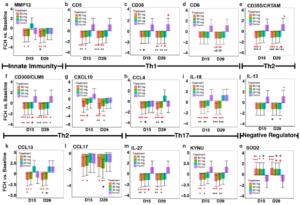Protein biomarker analysis is increasingly used in the clinical trials setting to generate invaluable additional data beyond primary clinical endpoints, providing unique insights into the deeper biology of the therapeutics under investigation, including a better understanding of drug MOA. One example of this approach came from a successful phase I clinical trial for the oral dual inhibitor of Janus kinase and spleen tyrosine kinase, ASN002, for atopic dermatitis (AD) patients.
When plasma samples taken longitudinally over the course of treatment from patients treated with ASN002 were compared to those from placebo subjects in the trial using Olink, significant reduction was seen in serum levels of individual markers of general inflammation, T-cell/B-cell markers, T-cell activation, innate immunity and T helper cell regulation. Further pathway enrichment analysis indicated that cytokine–cytokine-receptor interaction, cytokine, Th1–Th2, inflammatory, chemokine-receptor binding, chemokine signaling, JAK-STAT signaling and IL-23 signaling were the primary pathways affected by ASN002. One particularly interesting finding was that the drug significantly reduced the level of the known atherosclerosis marker, E-selectin. This raises the possibility that ASN002 could help protect against CVD risk, which is a known comorbidity in patients with AD.

Reduction of serum proteins in AD patients treated with ASN002 (Bissonnette et al., 2019)
Bissonnette R, Maai C, Forman S, Bhatia N, Lee M, Fowler J, Tyring S, Pariser D, Sofen H, Dhawn S, Zook M, Zammit D, Usansky H, Denis L, Rao N, Song T, Pavel A and Guttman-Yassky E. (2019) The oral Janus kinase/spleen tyrosine kinase inhibitor ASN002 demonstrates efficacy and improves associated systemic inflammation in patients with moderate‐to‐severe atopic dermatitis: results from a randomized double‐blind placebo‐controlled study. British Journal of Dermatology, Doi: 10.1111/bjd.17932


